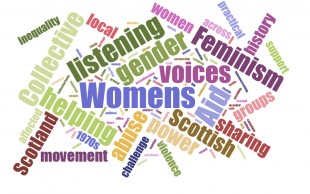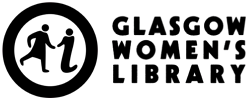
Morag Allan Campbell writes about her experience of carrying out the first oral history interviews for the Speaking Out project.
Last year, I gave up a full time job to study for a PhD in history at the University of St Andrews. It was a huge decision, not without its problems, and I thought that I should meet the whole experience with arms outstretched, and take every opportunity that I could (within reason). As a member of Women’s History Scotland, I got information about the Speaking Out project in a newsletter, and I decided to apply to be a volunteer as an oral history interviewer.
I’d have to admit, I had no idea what I was letting myself in for. My own research is about as far away from an oral history project that you can get. I’m looking at women in nineteenth century lunatic asylums, so I’m working purely in the archives – big dusty volumes of doctors’ notes, scratchy handwriting and, if I’m very, very lucky, notes from the women’s families, maybe even a faded photograph or two. So the idea of contributing to an archive, and actually speaking to women, hearing their stories, seemed like a different world.
The starting point was the training sessions, where we learned about the project, about Scottish Women’s Aid, and also about the wider issues and the history of the movement against violence towards women. There were plenty of things I didn’t know, and things that had never occurred to me. It’s not all about helping women to escape abusive relationships and providing refuge. And it’s not just about campaigning against violence. I hadn’t thought about the wider attitudes that have been changed by organisations like women’s aid, and the policy changes that just wouldn’t have happened without action being taken by those who realised things needed done.
Armed with a bit more knowledge about the issues faced by Women’s Aid, I approached my first interview with some trepidation. I’m not sure what I was afraid of, but I think it had something to do with the idea of recording the interview and then maybe deleting the whole thing accidentally. But when the time came, the recorder really was as easy to use as everyone had told me, and my first interviewee was lovely. We had coffee and chatted for ages, and I ended up being too engrossed in her stories to worry much about the recorder.
It’s been a refreshing change to get out of the archives and to talk to real women. Of course, the women in my research were real women too. I have tried hard to find out as much as possible about the patients whose case notes I have poured over, and it is difficult to hear their voices, yet they are there – faint and distant, but still audible. Despite the faded handwriting and the passing of the years, their stories can still be uncovered, and their voices can still be heard. Being involved with the Speaking Out project has in some way helped me to feel more connected to my own research, and to listen just that little bit harder.
Over the past month, working with Speaking Out, I’ve learned about women helping women. I’ve been inspired by the resilience of the women involved. I’ve been shocked, surprised and even amused by the stories I’ve heard. I’ve heard about tensions and fighting, divisions and dispute. I’ve heard about hope and determination. I have felt touched by the lives not only of the women I have spoken to, but also by the lives of the women who touched theirs.
By Morag Allan Campbell

Comments are closed.